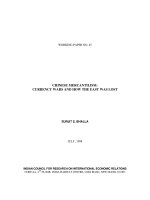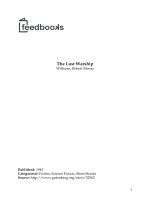The lost road
Bạn đang xem bản rút gọn của tài liệu. Xem và tải ngay bản đầy đủ của tài liệu tại đây (834.03 KB, 210 trang )
TheProjectGutenbergEBookofTheLostRoad,byRichardHardingDavis
ThiseBookisfortheuseofanyoneanywhereatnocostandwith
almostnorestrictionswhatsoever.Youmaycopyit,giveitawayor
re-useitunderthetermsoftheProjectGutenbergLicenseincluded
withthiseBookoronlineatwww.gutenberg.net
Title:TheLostRoad
Author:RichardHardingDavis
PostingDate:March21,2009[EBook#2283]
ReleaseDate:August,2000
Language:English
***STARTOFTHISPROJECTGUTENBERGEBOOKTHELOSTROAD***
ProducedbyMarleenHugo.HTMLversionbyAlHaines.
THELOSTROAD
THENOVELSANDSTORIESOF
RICHARDHARDINGDAVIS
TO
MYWIFE
Contains:
THELOSTROAD
THEMIRACLEOFLASPALMAS
EVILTOHIMWHOEVILTHINKS
THEMENOFZANZIBAR
THELONGARM
THEGODOFCOINCIDENCE
THEBURIEDTREASUREOFCOBRE
THEBOYSCOUT
SOMEWHEREINFRANCE
THEDESERTER
ANINTRODUCTIONBY
JOHNT.McCUTCHEON
WITHDAVISINVERACRUZ,BRUSSELS,ANDSALONIKA
IncommonwithmanyotherswhohavebeenwithRichardHardingDavisas
correspondents,Ifinditdifficulttorealizethathehascoveredhislaststoryand
thathewillnotbeseenagainwiththemenwhofollowthewargame,rushingto
distantplacesuponwhichthespotlightofnewsinterestsuddenlycentres.
Itseemsasortofbitterironythathewhohadcoveredsomanybigeventsof
worldimportance in thepast twentyyearsshould beabruptlytorn awayinthe
midstofthegreatesteventofthemall,whilethestoryisstillunfinishedandits
outcome undetermined. If there is a compensating thought, it lies in the
reflectionthathehadalifeofalmostunparalleledfulness,crowdedtothebrim,
up to the last moment, with those experiences and achievements which he
particularlyaspiredtohave.Heleftwhilethetidewasatitsflood,andwhilehe
still held supreme his place as the best reporter in his country. He escaped the
bitternessofseeingtheebbsetin,whentheyouthtowhichheclunghadslipped
away,andwhenhewouldhavetositimpatientintheaudience,whileyounger
menwereinthethickofgreat,world-stirringdramasonthestage.
This would have been a real tragedy in "Dick" Davis's case, for, while his
body would have aged, it is doubtful if his spirit ever would have lost its
youthfulfreshnessorboyishenthusiasm.
ItwasmyprivilegetoseeagooddealofDavisinthelasttwoyears.
He arrived in Vera Cruz among the first of the sixty or seventy
correspondentswhoflockedtothatnewscentrewhenthesituationwassofullof
sensational possibilities. It was a time when the American newspaper-reading
public was eager for thrills, and the ingenuity and resourcefulness of the
correspondentsinVeraCruzweretriedtotheuttermosttosupplythedemand.
InthefaceofthefiercestcompetitionitfelltoDavis'slottolandthebiggest
storyofthosedaysofmarkingtime.
Thestory"broke"whenitbecameknownthatDavis,MedillMcCormick,and
Frederick Palmer had gone through the Mexican lines in an effort to reach
Mexico City. Davis and McCormick, with letters to the Brazilian and British
ministers,gotthroughandreachedthecapitalonthestrengthofthoseletters,but
Palmer,havingonlyanAmericanpassport,wasturnedback.
AfteranominoussilencewhichfurnishedAmericannewspaperswithalively
periodofsuspense,thetwomenreturnedsafelywithwonderfulstoriesoftheir
experiences while under arrest in the hands of the Mexican authorities.
McCormick, in recently speaking of Davis at that time, said that, "as a
correspondent in difficult and dangerous situations, he was incomparable—
cheerful,ingenious,andundiscouraged.Whenthetimecametochoosebetween
safetyandleavinghiscompanionhestuckbyhisfellowcaptiveeventhough,as
they both said, a firing-squad and a blank wall were by no means a remote
possibility."
ThisMexicoCityadventurewasaspectacularachievementwhichgaveDavis
andMcCormickadistinctionwhichnoothercorrespondentsofalltheambitious
andablecorpshadmanagedtoattain.
Davisusually"hunted"alone.Hedependedentirelyuponhisowningenuity
andwonderfulinstinctfornewssituations.Hehadtheenergyandenthusiasmof
abeginner,withtheexperienceandtrainingofaveteran.Hisinterestinthings
remainedaskeenasthoughhehadnotbeenyearsatagamewhichoftenleavesa
manjadedandblase.HisacquaintanceshipintheAmericanarmyandnavywas
wide,andforthisreason,aswellasfortheprestigewhichhisfameandposition
as a national character gave him, he found it easy to establish valuable
connectionsinthechannelsfromwhichnewsemanates.Andyet,inspiteofthe
factthathewas"onhisown"insteadofhavingaworkingpartnershipwithother
men,hewasgenerousinhelpingattimeswhenhewasabletodoso.
DaviswasaconspicuousfigureinVeraCruz,asheinevitablyhadbeeninall
such situations. Wherever he went, he was pointed out. His distinction of
appearance, together with a distinction in dress, which, whether from habit or
policy, was avaluableassetinhis work,madehimamarkedman. Hedressed
andlookedthe"warcorrespondent,"suchaoneashewoulddescribeinoneof
his stories. He fulfilled the popular ideal of what a member of that fascinating
professionshouldlooklike.Hiscodeoflifeandhabitswasasfixedasthatofthe
Britonwhotakeshishabitsandcustomsandgamesandteawhereverhegoes,no
matterhowbenightedorremotethespotmaybe.
HewasjustasloyaltohiscodeasistheBriton.Hecarriedhisbath-tub,his
immaculatelinen,hiseveningclothes,hiswarequipment—inwhichhehadthe
pride of a connoisseur—wherever he went, and, what is more, he had the
couragetousetheeveningclothesattimeswhentheirusewasconspicuous.He
wastheonlymanwhoworeadinnercoatinVeraCruz,andeachnight,athis
particulartableinthecrowded"Portales,"attheHotelDiligencia,hewastobe
seen,asfreshandcleanasthoughhewereinaNewYorkorLondonrestaurant.
Each day he was up early to take the train out to the "gap," across which
camearrivalsfromMexicoCity.Sometimesagood"story"wouldcomedown,
aswhenthelong-heraldedandlong-expectedarrivalofConsulSillimangavea
first-page"feature"toalltheAmericanpapers.
In the afternoon he would play water polo over at the navy aviation camp,
andalwaysatacertaintimeofthedayhis"striker"wouldbringhimhishorse
and for an hour or more he would ride out along the beach roads within the
Americanlines.Afterthefirstfewdaysitwasdifficulttoextractrealthrillsfrom
the Vera Cruz situation, but we used to ride out to El Tejar with the cavalry
patrol and imagine that we might be fired on at some point in the long ride
throughunoccupiedterritory;orelsegoouttothe"front,"atLegarto,wherea
little American force occupied a sun-baked row of freight-cars, surrounded by
malarialswamps.Fromthetopoftherailroadwater-tank,wecouldlookacross
to the Mexican outposts a mile or so away. It was not very exciting, and what
thrillswegotlaychieflyinourimagination.
Before my acquaintanceship with Davis at Vera Cruz I had not known him
well. Our trails didn't cross while I was in Japan in the Japanese-Russian War,
andintheTransvaalImissedhimbyafewdays,butinVeraCruzIhadmany
enjoyableopportunitiesofbecomingwellacquaintedwithhim.
Theprivilegewasapleasantone,foritservedtodispelapreconceivedand
not an entirely favorable impression of his character. For years I had heard
storiesaboutRichardHardingDavis—storieswhichemphasizedanegotismand
self-assertivenesswhich,iftheyeverexisted,hadhappilyceasedtobeobtrusive
bythetimeIgottoknowhim.
HewasadifferentDavisfromtheDaviswhomIhadexpectedtofind;andI
can imagine no more charming and delightful companion than he was in Vera
Cruz. There was no evidence of those qualities which I feared to find, and his
attitudewasoneofunfailingkindness,considerateness,andgenerosity.
InthemanytalksIhadwithhim,Iwasalwaysstruckbyhisevidentdevotion
to a fixed code of personal conduct. In his writings he was the interpreter of
chivalrous,well-bredyouth, andhisheroeswereyoung,clean-thinkingcollege
men, heroic big-game hunters, war correspondents, and idealized men about
town,whoalwaysdidthenoblething,disdainingtheunworthyinactormotive.
Itseemedtomethathewasmodellinghisownlife,perhapsunconsciously,after
thefavoredtypeswhichhisimaginationhadcreatedforhisstories.Inacertain
sensehewaslivingalifeofmake-believe,whereinhewastheheroofthestory,
andinwhichhewasboundbyhisidealsalwaystoactashewouldhavethehero
ofhisstoryact.Itwasaqualitywhichonlyonecouldhavewhohadpreserveda
freshyouthfulnessofoutlookinspiteofthehardeningprocessesofmaturity.
Hispowerofobservationwasextraordinarilykeen,andhenotonlyhadthe
raregiftofsensingthevitalelementsofasituation,butalsohad,toanunrivalled
degree,theabilitytodescribethemvividly.Idon'tknowhowmanyofthosemen
at Verz Cruz tried to describe the kaleidoscopic life of the city during the
Americanoccupation,butIknowthatDavis'sstorywasfarandawaythemost
faithful and satisfying picture. The story was photographic, even to the sounds
andsmells.
ThelastIsawofhiminVeraCruzwaswhen,ontheUtah,hesteamedpast
theflagshipWyoming,uponwhichIwasquartered,andstartedforNewYork.
The Battenberg cup race had just been rowed, and the Utah and Florida crews
hadtied.AstheUtahwassailingimmediatelyaftertherace,therewasnotime
inwhichtorowoffthetie.Soitwasdecidedthatthenamesofbothshipsshould
beengravedonthecup,andthattheFloridacrewshoulddefendthetitleagainst
achallengingcrewfromtheBritishAdmiralCraddock'sflagship.
BytheendofJune,thepublicinterestinVeraCruzhadwaned,andthecorps
ofcorrespondentsdwindleduntiltherewereonlyafewleft.
FrederickPalmerandIwentuptojoinCarranzaandVilla,andonthe26thof
July we were in Monterey waiting to start with the triumphal march of
Carranza's army toward Mexico City. There was no sign of serious trouble
abroad.Thatnightominoustelegramscame,andatteno'clockonthefollowing
morningwewereonatrainheadedfortheStates.
PalmerandDaviscaughttheLusitania,sailingAugust4fromNewYork,and
IfollowedontheSaintPaul,leavingthreedayslater.Onthe17thofAugustI
reachedBrussels,anditseemedthemostnaturalthingintheworldtofindDavis
already there. He was at the Palace Hotel, where a number of American and
Englishcorrespondentswerequartered.
Thingsmovedquickly.Onthe19thIrvinCobb,WillIrwin,ArnoDosch,and
IwerecaughtbetweentheBelgianandGermanlinesinLouvain;ourretreatto
Brussels was cut, and for three days, while the vast German army moved
through the city, we were detained. Then, the army having passed, we were
allowedtogobacktothecapital.
InthemeantimeDaviswasinBrussels.TheGermansreachedtheoutskirtsof
thecityonthemorningofthe20th,andthecorrespondentswhohadremainedin
Brusselswerefeverishlywritingdespatchesdescribingtheimminentfallofthe
city.Oneofthem,HarryHansen,oftheChicagoDailyNews,tellsthefollowing
story,whichIgiveinhiswords:
"Whilewewerewriting,"saysHansen,"RichardHardingDaviswalkedinto
the writing-room of the Palace Hotel with a bunch of manuscript in his hand.
With an amused expression he surveyed the three correspondents filling white
paper.
"'Isay,men,'saidDavis,'doyouknowwhenthenexttrainleaves?'
"'Thereisoneatthreeo'clock,'saidacorrespondent,lookingup.
"'Thatlookslikeouronlychancetogetastoryout,'saidDavis.'Well,we'll
trusttothat.'
"ThestorywastheGermaninvasionofBrussels,andthetrainmentionedwas
considered the forlorn hope of the correspondents to connect with the outside
world—that is, every correspondent thought it to be the other man's hope.
Secretly each had prepared to outwit the other, and secretly Davis had already
senthisstorytoOstend.HemeanttoemulateArchibaldForbes,whodespatched
a courier with his real manuscript, and next day publicly dropped a bulky
packageinthemail-bag.
"Davis had sensed the news in the occupation of Brussels long before it
happened.WithdawnhewentouttotheLouvainroad,wheretheGermanarmy
stood, prepared to smash the capital if negotiations failed. His observant eye
tookinallthedetails.Beforenoonhehadwrittenacomprehensivesketchofthe
occupation, and when word was received that it was under way, he trusted his
copytoanoldFlemishwoman,whospokenotawordofEnglish,andsawher
safelyonboardthetrainthatpulledoutunderBelgianauspicesforOstend."
With passes which the German commandant in Brussels gave us the
correspondentsimmediatelystartedouttoseehowfarthosepasseswouldcarry
us.AnumberofusleftontheafternoonofAugust23forWaterloo,whereitwas
expectedthatthegreatclashbetweentheGermanandtheAnglo-Frenchforces
wouldoccur.Wehadplannedtobebackthesameevening,andwentprepared
onlyforanafternoon'sdriveinacoupleof hiredstreetcarriages.Itwasseven
weeksbeforeweagainsawBrussels.
Onthefollowingday(August24)DavisstartedforMons.Heworethekhaki
uniformwhichhehadworninmanycampaigns.Acrosshisbreastwasanarrow
bar of silk ribbon indicating the campaigns in which he had served as a
correspondent.HesomuchresembledaBritishofficerthathewasarrestedasa
Britishderelictandwasinformedthathewouldbeshotatonce.
He escaped only by offering to walk to Brand Whitlock, in Brussels,
reporting to each officer he met on the way. His plan was approved, and as a
hostage on parole he appeared before the American minister, who quickly
established his identity as an American of good standing, to the satisfaction of
theGermans.
In the following few months our trails were widely separated. I read of his
arrest by German officers on the road to Mons; later I read the story of his
departure fromBrusselsbytraintoHolland—atripwhichcarriedhimthrough
Louvainwhilethetownstillwasburning;andstilllaterIreadthathewaswith
thefewluckymenwhowereinRheimsduringoneoftheearlybombardments
that damaged the cathedral. By amazing luck, combined with a natural news
sense which drew him instinctively to critical places at the psychological
moment, he had been a witness of the two most widely featured stories of the
earlyweeksofthewar.
Arrestedbythe GermansinBelgium,andlaterbythe FrenchinFrance,he
wasconvincedthattherestrictionsoncorrespondentsweretoogreattopermitof
goodwork.
SohelefttheEuropeanwarzonewiththewidelyquotedremark:"Thedayof
thewarcorrespondentisover."
AndyetIwasnotsurprisedwhen,oneevening,lateinNovemberoflastyear,
he suddenly walked into the room in Salonika where William G. Shepherd, of
the United Press, "Jimmy Hare," the veteran war photographer, and I had
establishedourselvesseveralweeksbefore.
The hotel was jammed, and the city, with a normal capacity of about one
hundred and seventy-five thousand, was struggling to accommodate at least a
hundred thousand more. There was not a room to be had in any of the better
hotels,andforseveraldayswelodgedDavisinourroom,avastchamberwhich
formerly had been the main dining-room of the establishment, and which now
wasconvertedintoabedroom.Therewasroomforadozenmen,ifnecessary,
and whenever stranded Americans arrived and could find no hotel
accommodationswesimplyriggedupemergencycotsfortheirtemporaryuse.
TheweatherinSalonikaatthistime,lateNovember,waspenetratinglycold.
Inthemorningsthesteamcoilsstruggledfeeblytodispelthechillintheroom.
EarlyinthemorningafterDavishadarrived,wewerearousedbythesound
ofviolentsplashing,accompaniedbyshudderinggasps,andwelookedoutfrom
thesnugwarmthofourbedstoseeDavisstandinginhisportablebath-tuband
drenchinghimselfwithice-coldwater.Asanexhibitionofcourageousdevotion
to an established custom of life it was admirable, but I'm not sure that it was
prudent.
For some reason, perhaps a defective circulation or a weakened heart, his
system failed to react from these cold-water baths. All through the days he
complainedoffeelingchilled.Heneverseemedtogetthoroughlywarmed,and
ofusallhewastheonewhosufferedmostkeenlyfromthecold.Itwasallthe
more surprising, for his appearance was always that of a man in the pink of
athleticfitness—ruddy-faced,clear-eyed,andfulloftirelessenergy.
OnoneoccasionwereturnedfromtheFrenchfrontinSerbiatoSalonikaina
box car lighted only by candles, bitterly cold, and frightfully exhausting. We
weresevenhoursintravellingfifty-fivemiles,andwearrivedatourdestination
atthreeo'clockin themorning.Severalofthemencontracteddesperatecolds,
whichclungtothemforweeks.Daviswaschilledthrough,andsaidthatofall
thecoldhehadeverexperiencedthatwhichsweptacrosstheMacedonianplain
from the Balkan highlands was the most penetrating. Even his heavy clothing
couldnotaffordhimadequateprotection.
When he was settled in his own room in our hotel he installed an oil-stove
whichburnedbesidehimashesatathisdeskandwrotehisstories.Theroom
waslikeanoven,buteventhenhestillcomplainedofthecold.
Whenhelefthegaveusthestove,andwhenweleft,sometimelater,itwas
presentedtooneofourdoctorfriendsoutinaBritishhospital,whereI'msureit
isdoingitsbesttothawtheBalkanchilloutofsickandwoundedsoldiers.
Davis was always up early, and his energy and interest were as keen as a
boy's. We had our meals together, sometimes in the crowded and rather smart
Bastasini's,butmoreofteninthemaelstromofhumanitythatnightlypackedthe
Olympos Palace restaurant. Davis, Shepherd, Hare, and I, with sometimes Mr.
and Mrs. John Bass, made up these parties, which, for a period of about two
weeksorso,werethemostenjoyabledailyeventsofourlives.
Undertheglaringlightsoftherestaurant,andsurroundedbyBritish,French,
Greek, and Serbian officers, German, Austrian, and Bulgarian civilians, with a
sprinkling of American, English, and Scotch nurses and doctors, packed so
solidlyinthehuge,high-ceilingedroomthatthewaiterscouldbarelypicktheir
wayamongthetables,wehungforhoursoverourdinners,andleftonlywhen
thelandlordandhisAustrianwifecountedtheday'sreceiptsandpaidthewaiters
attheendoftheevening.
One could not imagine a more charming and delightful companion than
Davis during these days. While he always asserted that he could not make a
speech, and was terrified at the thought of standing up at a banquet-table, yet,
sitting at a dinner-table with a few friends who were only too eager to listen
ratherthantotalk,hisstories,coveringpersonalexperiencesinallpartsofthe
world, were intensely vivid, with that remarkable "holding" quality of
descriptionwhichcharacterizeshiswritings.
Hebroughthisownbread—acoarse,brownsort,whichhepreferredtothe
betterwhitebread—andwithitheategreatquantitiesofbutter.Aswesatdown
atthetablehisfirstdemandwasfor"Mastika,"apeculiarGreekdrinkdistilled
frommasticgum,andhisseconddemandinvariablywas"Dubeurre!"withthe
"r's"assilentasthestars;andifitfailedtocomeatoncethewaiterwasmadeto
feeltheenormityofhistardiness.
ThereminiscencesrangedfromhisearlynewspaperdaysinPhiladelphia,and
skipping from Manchuria to Cuba and Central America, to his early Sun days
under Arthur Brisbane; they ranged through an endless variety of personal
experienceswhichverynearlycoveredthewholecourseofAmericanhistoryin
thepasttwentyyears.
Perhaps to him it was pleasant to go over his remarkable adventures, but it
could not have been half as pleasant as it was to hear them, told as they were
with a keenness of description and brilliancy of humorous comment that made
themgemsofnarrative.
At times, in our work, we all tried our hands at describing the Salonika of
those early days of the Allied occupation, for it was really what one widely
travelledBritishofficercalledit—"themostamazinglyinterestingsituationI've
ever seen"—-but Davis's description was far and away the best, just as his
descriptionofVeraCruzwasthebest,andhiswonderfulstoryoftheentryofthe
GermanarmyintoBrusselswasmatchlessasoneofthegreatpiecesofreporting
inthepresentwar.
InthinkingofDavis,Ishallalwaysrememberhimforthedelightfulqualities
which he showed in Salonika. He was unfailingly considerate and thoughtful.
Throughhisnarrativesonecouldseethepridewhichhetookinthewidthand
breadthofhispersonalrelationtothegreateventsofthepasttwentyyears.His
vastscopeofexperiencesandequallywideacquaintanceshipwiththebigfigures
ofourtime,wereamazing,anditwasequallyamazingthatoneofsucharich
and interesting history could tell his stories in such a simple way that the
personalelementwasneverobtrusive.
When he left Salonika he endeavored to obtain permission from the British
stafftovisitMoudros,but,failinginthis,hebookedhispassageonacrowded
littleGreeksteamer,wheretheonlyobtainableaccommodationwasaloungein
thediningsaloon.Wegavehimafarewelldinner,atwhichtheAmericanconsul
andhisfamily,withalltheotherAmericanstheninSalonika,werepresent,and
after the dinner we rowed out to his ship and saw him very uncomfortably
installedforhisvoyage.
Hecamedownthesealadderandwaved hishand aswerowed away.That
wasthelastIsawofRichardHardingDavis.
JOHNT.MCCUTCHEON.
THELOSTROAD
DuringthewarwithSpain,ColtonLeecameintotheserviceasavolunteer.
Forayoungman,healwayshadtakenlifealmosttooseriously,andwhen,after
the campaign in Cuba, he elected to make soldiering his profession, the
seriousnesswithwhichheattackedhisnewworksurprisednoone.Findingthey
had lost him forever, his former intimates were bored, but his colonel was
enthusiastic,andthemenofhistroopnotonlyloved,butrespectedhim.
Fromthestarthedeterminedinhisnewlifewomenshouldhavenopart—a
determinationthatpuzzlednoonesomuchasthewomen,fortoLeenowoman,
oldoryoung,hadfoundcausetobeunfriendly.Buthehadreadthatthearmyis
ajealousmistresswhobrooksnorival,that"redlipstarnishthescabbardsteel,"
that"hetravelsthefastestwhotravelsalone."
So, when white hands beckoned and pretty eyes signalled, he did not look.
For five years, until just before he sailed for his three years of duty in the
Philippines,hesucceedednotonlyinnotlooking,butinbuildingupforhimself
suchafinereputationasawoman-haterthatallwomenwerecrazyabouthim.
HadhenotbeenorderedtoAgawamsettthatfactwouldnothaveaffectedhim.
But at the Officers' School he had indulged in hard study rather than in hard
riding, had overworked, had brought back his Cuban fever, and was in poor
shape to face the tropics. So, for two months before the transport was to sail,
they ordered him to Cape Cod to fill his lungs with the bracing air of a New
Englandautumn.
HeselectedAgawamsett,because,whenatHarvard,itwastherehehadspent
his summer vacations, and he knew he would find sailboats and tennis and,
through the pine woods back of the little whaling village, many miles of
untravelled roads. He promised himself that over these he would gallop an
imaginarytroopinroutemarches,wouldmanoeuvreitagainstpossibleambush,
and,incombatpatrols,groundscouts,andcossackoutposts,chargewithit"as
foragers." But he did none of these things. For at Agawamsett he met Frances
Gardner,andhisexperiencewithherwassodisastrousthat,inhisdetermination
toavoidallwomen,hewasconvincedhewasright.
WhenlaterhereachedManilahevowednootherwomanwouldeveragain
find a place in his thoughts. No other woman did. Not because he had the
strength to keep his vow, but because he so continually thought of Frances
Gardnerthatnootherwomanhadachance.
MissGardnerwasaremarkablegirl.Hercharmappealedtoallkindsofmen,
and,unfortunatelyforLee,severalkindsofmenappealedtoher.Herfortuneand
her relationswere boundupin thepersonofa rich aunt withwhomshelived,
and who, it was understood, some day would leave her all the money in the
world.But,inspiteofhercharm,certainlyinspiteoftherichaunt,Lee,trueto
his determination, might not have noticed the girl had not she ridden so
extremelywell.
Itwastothecaptainofcavalryshefirstappealed.Butevenacavalrycaptain,
whosedutyinlifeistoinstructsixtymenintheartoftakingthelifeofasmany
othermenaspossible,mayturnhisheadinthedirectionofagood-lookinggirl.
Andwhenforweeksamanridesatthesideofonethroughpineforestsasdim
andmysteriousastheaislesofagreatcathedral,whenheguidesheracrossthe
wetmarsheswhenthesunissettingcrimsoninthepoolsandthewindblowssalt
from the sea, when he loses them both by moonlight in wood-roads where the
hoofs of the horses sink silently into dusty pine needles, he thinks more
frequentlyofthegirlathissidethanofthefaithfultrooperswaitingforhimin
SanFrancisco.Thegirlathissidethoughtfrequentlyofhim.
Withthe"surfaceindications"ofayoungmanabouttoaskhertomarryhim
she was painfully familiar; but this time the possibility was the reverse of
painful.Whatshemeanttodoaboutitshedidnotknow,butshedidknowthat
she was strangely happy. Between living on as the dependent of a somewhat
exactingrelativeandbecomingthefullpartnerofthisyoungstranger,whowith
men had proved himself so masterful, and who with her was so gentle, there
seemed but little choice. But she did not as yet wish to make the choice. She
preferredtobelieveshewasnotcertain.Sheassuredhimthatbeforehisleaveof
absencewasovershewouldtellhimwhethershewouldremainondutywiththe
querulous aunt, who had befriended her, or as his wife accompany him to the
Philippines.
Itwasnottheanswerhewanted;butinherhappiness,whichwasevidentto
everyone,hecouldnothelpbuttakehope.Andinthequestionssheputtohim
oflifeinthetropics,ofthelifeofthe"officers'ladies,"hesawthatwhatwasin
hermindwasapossiblelifewithhim,andhewascontent.
Shebecametohimawonderful,gloriousperson,andeachdayshegrewin
loveliness. It had been five years of soldiering in Cuba, China, and on the
Mexicanbordersincehehadtalkedtoawomanwithinterest,andnowinallshe
said, in all her thoughts and words and delights, he found fresher and stronger
reasons for discarding his determination to remain wedded only to the United
StatesArmy.Hedidnotneedreasons.Hewasfartoomuchinlovetoseeinany
wordoractofhersanythingthatwasnotfineandbeautiful.
Intheirridestheyhadonedaystumbleduponalong-lostandlong-forgotten
road through the woods, which she had claimed as their own by right of
discovery, and, no matter to what point they set forth each day, they always
returned by it. Their way through the woods stretched for miles. It was
concealed in a forest of stunted oaks and black pines, with no sign of human
habitation,savehereandthereaclearingnowlongneglectedandaliveonlywith
goldenrod.Trunksoftrees,moss-grownandcrumblingbeneaththetouchofthe
ponies'hoofs,layintheirpath,andaboveitthebranchesofayoungergeneration
hadclaspedhands.Attheirapproachsquirrelsracedforshelter,woodcockand
partridgeshotdeeperintothenetworkofvinesandsaplings,andtheclickofthe
steelastheponiestossedtheirbits,andtheirownwhispers,alonedisturbedthe
silence.
"Itisanenchantedroad,"saidthegirl;"ormaybeweareenchanted."
"Not I," cried the young man loyally. "I was never so sane, never so sure,
neversohappyinknowingjustwhatIwanted!Ifonlyyoucouldbeassure!"
Onedayshecametohiminhighexcitementwithabookofverse."Hehas
writtenapoem,"shecried,"aboutourownwoods,aboutourlostroad!Listen"
shecommanded,andshereadtohim:
"'TheyshuttheroadthroughthewoodsSeventyyearsago.Weatherandrain
haveundoneitagain,AndnowyouwouldneverknowTherewasoncearoad
throughthewoodsBeforetheyplantedthetrees.Itisunderneaththecoppiceand
heath, And the thin anemones. Only the keeper sees That, where the ringdove
broods,Andthebadgersrollatease,Therewasoncearoadthroughthewoods.
"'Yet,ifyouenterthewoodsOfasummereveninglate,Whenthenightair
coolsonthetrout-ringedpoolsWheretheotterwhistleshismate(Theyfearnot
meninthewoodsBecausetheyseesofew),Youwillhearthebeatofahorse's
feet,Andtheswishofaskirtinthedew,SteadilycanteringthroughThemisty
solitudes,AsthoughtheyperfectlyknewTheoldlostroadthroughthewoods....
Butthereisnoroadthroughthewoods.'"
"I don't like that at all," cried the soldierman. "It's too—too sad—it doesn't
give you any encouragement. The way it ends, I mean: 'But there is no road
through the woods.' Of course there's a road! For us there always will be. I'm
goingtomakesure.I'mgoingtobuythosewoods,andkeepthelostroadwhere
wecanalwaysfindit."
"Idon'tthink,"saidthegirl,"thathemeansarealroad."
"Iknow whathemeans,"criedthelover,"andhe's wrong!There is aroad,
andyouandIhavefoundit,andwearegoingtofollowitforalways."
Thegirlshookherhead,buthereyesweresmilinghappily.
The "season" at Agawamsett closed with the tennis tournament, and it was
generally conceded fit and proper, from every point of view, that in mixed
doublesLeeandMissGardnershouldbepartners.YoungStedman,theBoston
artist, was the only one who made objection. Up in the sail-loft that he had
turnedintoastudiohewaspaintingaportraitofthelovelyMissGardner,andhe
protested that the three days' tournament would sadly interrupt his work. And
Frances,whowasverymuchinterestedintheportrait,wasinclinedtoagree.
ButLeebeatdownherobjections.Hewasnotatallinterestedintheportrait.
Hedisapprovedofitentirely.ForthesittingsrobbedhimofFrancesduringthe
betterpartofeachmorning,andheurgedthatwhenhemustsosoonleaveher,
betweenthemanwhowantedherportraitandthemanwhowantedher,itwould
bekindtogivehertimetothelatter.
"ButIhadnoidea,"protestedFrances,"hewouldtakesolong.Hetoldme
he'dfinishitinthreesittings.Buthe'ssocriticalofhisownworkthathegoes
over it again and again. He says that I am a most difficult subject, but that I
inspirehim.Andhesays,ifIwillonlygivehimtime,hebelievesthiswillbethe
bestthinghehasdone."
"That'sanawfulthought,"saidthecavalryofficer.
"You don't like him," reproved Miss Gardner. "He is always very polite to
you."
"He'spolitetoeverybody,"saidLee;"that'swhyIdon'tlikehim.He'snota
realartist.He'sacourtier.Godgavehimatalent,andhemakesameanuseofit.
Usesittoflatterpeople.He'sliketheselong-hairedviolinistswhoplayanything
youaskthemtointhelobsterpalaces."
MissGardnerlookedawayfromhim.Hercolorwashighandhereyesvery
bright.
"Ithink,"shesaidsteadily,"thatMr.Stedmanisagreatartist,andsomeday
alltheworldwillthinkso,too!"
Lee made no answer. Not because he disagreed with her estimate of Mr.
Stedman's genius-he made no pretense of being an art critic—but because her
vehementadmirationhadfilledhimwithsuddenpanic.Hewasnotjealous.For
that he was far too humble. Indeed, he thought himself so utterly unworthy of
FrancesGardnerthatthefactthattohimshemightprefersomeoneelsewasin
nowayasurprise.Heonlyknewthatifsheshouldprefersomeoneelsenotall
histroophorsesnorallhismencouldputHumptyDumptybackagain.
But if, in regard to Mr. Stedman, Miss Gardner had for a moment been at
oddswiththemanwholovedher,shemadeupforitthedayfollowingonthe
tenniscourt.Thereshewasinaccordwithhiminheart,soul,andbody,andher
sharp "Well played, partner!" thrilled him like one of his own bugle calls. For
two days against visiting and local teams they fought their way through the
tournament, and the struggle with her at his side filled Lee with a great
happiness. Not that the championship of Agawamsett counted greatly to one
exiledforthreeyearstoliveamongtheMoros.Hewantedtowinbecauseshe
wantedtowin.Buthishappinesscameindoingsomethingincommonwithher,
inhelpingherandinhavingherhelphim,inbeing,ifonlyinplay,ifonlyfor
threedays,her"partner."
After they won they walked home together, each swinging a fat, heavy
loving-cup.Oneachwasengraved:
"Mixeddoubles,Agawamsett,1910."
Leeheldhisupsothatthesettingsunflashedonthesilver.
"Iamgoingtokeepthat,"hesaid,"aslongasIlive.Itmeansyouwereonce
my 'partner.' It's a sign that once we two worked together for something and
won."Inthewordsthemanshowedsuchfeelingthatthegirlsaidsoberly:
"Minemeansthattome,too.Iwillneverpartwithmine,either."
Leeturnedtoherandsmiled,appealingwistfully.
"Itseemsapitytoseparatethem,"hesaid."They'dlookwelltogetheroveran
openfireplace."
Thegirlfrownedunhappily."Idon'tknow,"sheprotested."Idon'tknow."
ThenextdayLeereceivedfromtheWarDepartmentatelegramdirectinghim
to "proceed without delay" to San Francisco, and there to embark for the
Philippines.
Thatnightheputthequestiontoherdirectly,butagainsheshookherhead
unhappily;againshesaid:"Idon'tknow!"
So he sailed without her, and each evening at sunset, as the great transport
heavedherwayacrosstheswellof thePacific,hestoodatthe railandlooked
back.Withtheaidofthefirstofficerhecalculatedthedifferenceintimebetween
a whaling village situated at forty-four degrees north and an army transport
droppingrapidlytowardtheequator,andso,eachday,keptinstepwiththegirl
heloved.
"Now," he would tell himself, "she is in her cart in front of the post-office,
and while they sort the morning mail she gossips with the fisher folks, the
summerfolks,thegrooms,andchauffeurs.Nowsheissittingforherportraitto
Stedman" (he did not dwell long on that part of her day), "and now she is at
tennis,or,asshepromised,ridingaloneatsunsetdownourlostroadthroughthe
woods."
ButthatpartofherdayfromwhichLeehurriedwasthatpartoverwhichthe
girl herself lingered. As he turned his eyes from his canvas to meet hers,
Stedman, the charming, the deferential, the adroit, who never allowed his
paintingtointerrupthistalk,toldherofwhathewaspleasedtocallhisdreams
andambitions,ofthegreatandbeautifulladieswhohadsatbeforehiseasel,and
oftheonlyoneofthemwhohadgivenhiminspiration.Especiallyof theonly
one who had given him inspiration. With her always to uplift him, he could
become one of the world's most famous artists, and she would go down into
historyasthebeautifulwomanwhohadhelpedhim,asthewifeofRembrandt
hadinspiredRembrandt,as"MonaLisa"hadmadeLeonardo.
Gilbertwrote:"Itisnottheloverwhocomestowoo,butthelover'swayof
wooing!"Hissuccessfulloverwastheonewhothrewthegirlacrosshissaddle
androdeawaywithher.Butonekindofwomandoesnotliketohaveherlover
approachshouting:"Atthegallop!Charge!"
She prefers a man not because he is masterful, but because he is not. She
likestobelievethemanneedshermorethansheneedshim,thatshe,andonly
she,cansteadyhim,cheerhim,keephimtruetotheworkheisintheworldto
perform.Itiscalledthe"mothering"instinct.
Frances felt this mothering instinct toward the sensitive, imaginative,
charming Stedman. She believed he had but two thoughts, his art and herself.
She was content to place his art first. She could not guess that to one so
unworldly,toonesowrappedupinhisart,thefortuneofarichauntmightprove
alluring.
WhenthetransportfinallypickedupthelandfallsofCaviteHarbor,Lee,with
theinstinctofasoldier,didnotexclaim:"ThisiswhereDeweyranthefortsand
sank the Spanish fleet!" On the contrary, he was saying: "When she comes to
joinme,itwillbehereIwillfirstseehersteamer.Iwillbewaitingwithafieldglassontheendofthatwharf.No,Iwillbeouthereinashore-boatwavingmy
hat.Andofallthosealongtherail,myheartwilltellmewhichisshe!"
ThenabarefootedFilipinoboyhandedhimanunsignedcablegram.Itread:
"IfIwroteathousandwordsIcouldnotmakeiteasierforeitherofus.Iamto
marryArthurStedmaninDecember."
Lee was grateful for the fact that he was not permitted to linger in Manila.
Instead, he was at once ordered up-country, where at a one-troop post he
administeredtheaffairsofasomewhathecticprovince,andundertheguidance
of the local constabulary chased will-o'-the-wisp brigands. On a shelf in his
quartersheplacedthesilverloving-cup,andatnight,whenthevillageslept,he
wouldsitfacingit,fillingonepipeafteranother,andthroughthesmokestaring
attheevidencetothefactthatonceFrancesGardnerandhehadbeenpartners.
Inthesepost-mortemshesawnothingmorbid.Withhispresentactivitiesthey
innowayinterfered,andinthinkingofthedayswhentheyhadbeentogether,in
thinkingofwhathehadlost,hefounddeepcontent.Anotherman,havinglost
thewomanheloved,wouldhavetriedtoforgetherandallshemeanttohim.But
Lee was far too honest with himself to substitute other thoughts for those that
were glorious, that still thrilled him. The girl could take herself from him, but
shecouldnottakehisloveforherfromhim.Andforthathewasgrateful.He
never had considered himself worthy, and so could not believe he had been ill
used.Inhisthoughtsofhertherewasnobitterness:forthatalsohewasgrateful.
And,asheknewhewouldnotcareforanyotherwomaninthewayhecaredfor
her,hepreferredtocareinthatway,evenforonewhowaslost,thaninalesser
way for a possible she who some day might greatly care for him. So she still
remained in his thoughts, and was so constantly with him that he led a dual
existence,inwhichbydayhedirectedtheaffairsofanalienandhostilepeople
andbynightagainlivedthroughthewonderfulmomentswhenshehadthought
she loved him, when he first had learned to love her. At times she seemed
actually at his side, and he could not tell whether he was pretending that this
weresoorwhethertheforceofhislovehadprojectedherimagehalfaroundthe
world.
Often,wheninsinglefileheledthementhroughtheforest,heseemedagain
to be back on Cape Cod picking his way over their own lost road through the
wood, and he heard "the beat of a horse's feet and the swish of a skirt in the
dew."Andthenacarbinewouldrattle,orahorsewouldstumbleandatrooper
swear,andhewasagaininthesweatingjungle,wheremen,intentuponhislife,
crouchedinambush.
Shesparedhimthemockeryofwedding-cards;buttheannouncementofthe
wedding came to him in a three-months-old newspaper. Hoping they would
speak of her in their letters, he kept up a somewhat one-sided correspondence
withfriendsofMrs.Stedman'sinBoston,whereshenowlived.Butforayearin
noneoftheirlettersdidhernameappear.Whenamutualfrienddidwriteofher
Leeunderstoodthesilence.
From the first, the mutual friend wrote, the life of Mrs. Stedman and her
husband was thoroughly miserable. Stedman blamed her because she came to
him penniless. The rich aunt, who had heartily disapproved of the artist, had
spokenofhimsofranklythatFranceshadquarrelledwithher,andfromherno
longer would accept money. In his anger at this Stedman showed himself to
Frances as he was. And only two months after their marriage she was further
enlightened.
An irate husband made him the central figure in a scandal that filled the
friends of Frances with disgust, and that for her was an awakening cruel and
humiliating. Men no longer permitted their womenfolk to sit to Stedman for a
portrait,andtheneedofmoneygrewimperative.HethemoreblamedFrances
forhavingquarrelledwithheraunt,toldheritwasforhermoneyhehadmarried
her,thatshehadruinedhiscareer,andthatshewastoblameforhisostracism—
aconditionthathisownmisconducthadbroughtuponhim.Finally,aftertwelve
monthsofthis,onemorningheleftanotesayinghenolongerwouldallowher
tobeadraguponhim,andsailedforEurope.
They learned that, in Paris, he had returned to that life which before his
marriage,eveninthateasy-goingcity,hadmadehimnotorious."AndFrances,"
continuedLee'scorrespondent,"hasleftBoston,andnowlivesinNewYork.She
wouldn'tletanyofushelpher,norevenknowwheresheis.Thelastweheardof
hershewasinchargeofthecomplaintdepartmentofamillineryshop,forwhich
workshewasreceivingaboutthesamewagesIgivemycook."
Lee did not stop to wonder why the same woman, who to one man was a
"drag,"wastoanother,eventhoughseparatedfromherbyhalftheworld,ajoy
and a blessing. Instead, he promptly wrote his lawyers to find Mrs. Stedman,
and, in such a way as to keep her ignorant of their good offices, see that she
obtainedapositionmorecongenialthanherpresentone,andonethatwouldpay
herasmuchas,withoutarousinghersuspicions,theyfounditpossibletogive.
Three months had passed, and this letter had not been answered, when in
Manila,wherehehadbeenorderedtomakeareport,heheardofheragain.One
evening, when the band played on the Luneta, he met a newly married couple
who had known him in Agawamsett. They now were on a ninety-day cruise
around the world. Close friends of Frances Gardner, they remembered him as
oneofhermanydevoteesandatoncespokeofher.
"That blackguard she married," the bridegroom told him, "was killed three
monthsagoracingwithanothercarfromVersaillesbacktoParisafteradinnerat
which, it seems, all present drank 'burgundy out of the fingerbowls.' Coming
down that steep hill into Saint Cloud, the cars collided, and Stedman and a
woman, whose husband thought she was somewhere else, were killed. He
couldn'tevendiewithoutmakingascandalofit."
"Buttheworst,"addedthebride,"isthat,inspiteofthewaythelittlebeast
treatedher,IbelieveFrancesstillcaresforhim,andalwayswill.That'stheworst
ofit,isn'tit?"shedemanded.
Inwords,Lee didnotanswer,butinhisheartheagreedthatwasmuchthe
worstofit.ThefactthatFranceswasfreefilledhimwithhope;butthatshestill
cared for the man she had married, and would continue to think only of him,
madehimillwithdespair.
He cabled his lawyers for her address. He determined that, at once, on
learning it, he would tell her that with him nothing was changed. He had
forgotten nothing, and had learned much. He had learned that his love for her
wasasplendidandinspiringpassion,thatevenwithoutherithadliftedhimup,
helpedandcheeredhim,madethewholeworldkindandbeautiful.Withherhe
couldnotpictureaworldsocompletewithhappiness.
Sinceenteringthearmyhehadnevertakenaleaveofabsence,andhewas
sure, if now he asked for one, it would not be refused. He determined, if the
answer to his cable gave him the address, he would return at once, and again
offer her his love, which he now knew was deeper, finer, and infinitely more
tenderthanthelovehefirsthadfeltforher.Butthecablebalkedhim."Address
unknown,"itread;"believedtohavegoneabroadincapacityofgoverness.Have
employedforeignagents.Willcabletheirreport."
Whether to wait for and be guided by the report of the detectives, or to
proceed to Europe and search for her himself, Lee did not know. He finally
determinedthattoseekforherwithnoclewtoherwhereaboutswouldbebuta
wasteofpreciousmoments,while,ifintheirsearchtheagentsweresuccessful,
he would be able to go directly to her. Meanwhile, by cable, he asked for
protracted leave of absence and, while waiting for his answer, returned to his
post.There,withinaweek,hereceivedhisleaveofabsence,butinafashionthat
threatenedtoremovehimforeverfromthearmy.
Theconstabularyhadlocatedthewill-o'-the-wispbrigandsbehindastockade
built about an extinct volcano, and Lee and his troop and a mountain battery
attempted to dislodge them. In the fight that followed Lee covered his brows
withlaurelwreathsandreceivedtwobulletwoundsinhisbody.
For a month death stood at the side of his cot; and then, still weak and at
times delirious with fever, by slow stages he was removed to the hospital in
Manila. In one of his sane moments a cable was shown him. It read:
"Whereaboutsstillunknown."Leeatoncerebelledagainsthisdoctors.Hemust
rise,hedeclared,andproceedtoEurope.Itwasuponamatteroflifeanddeath.
Thesurgeonsassuredhimhisremainingexactlywherehewasalsowasamatter
ofasgreatconsequence.Lee'sknowledgeofhisownlackofstrengthtoldhim
theywereright.
Then,fromheadquarters,hewasinformedthat,asarewardforhisservices
andinrecognitionofhisapproachingconvalescence,hewasorderedtoreturnto
his own climate and that an easy billet had been found for him as a recruiting
officer in New York City. Believing the woman he loved to be in Europe, this
plan for his comfort only succeeded in bringing on a relapse. But the day
followingtherecameanothercablegram.Itputanabruptendtohismutiny,and
broughthimandtheWarDepartmentintocompleteaccord.
"She is in New York," it read, "acting as agent for a charitable institution,
whichonenotknown,buthopeinafewdaystocablecorrectaddress."
Inalltheworldtherewasnomansohappy.Thenextmorningatransportwas
sailing,and,probablybecausetheyhadreadthecablegram,thesurgeonsagreed
withLeethataseavoyagewoulddohimnoharm.Hewascarriedonboard,and
whenthepropellersfirstchurnedthewaterandheknewhewasmovingtoward
her,theheroofthefightaroundthecratershedunmanlytears.Hewouldseeher
again, hear her voice; the same great city would shelter them. It was worth a
dozenbullets.
HereachedNewYorkinasnow-storm,aweekbeforeChristmas,andwent
straighttotheofficeofhislawyers.Theyreceivedhimwithembarrassment.Six
weeks before, on the very day they had cabled him that Mrs. Stedman was in
NewYork,shehadleftthecharitableinstitutionwhereshehadbeenemployed,
andhadagaindisappeared.
Lee sent his trunks to the Army and Navy Club, which was immediately
around the corner from the recruiting office in Sixth Avenue, and began
dischargingtelegramsateveryonewhohadeverknownFrancesGardner.The
netresultwasdiscouraging.Intheyearandahalfinwhichhehadbeenabsent
everyfriendofthegirlhesoughthadtemporarilychangedhisplaceofresidence
orwaspermanentlydead.
Meanwhile his arrival by the transport was announced in the afternoon
papers.Atthewharfanadmiringtrooperhadtoldafinetaleofhisconductatthe
battle of the crater, and reporters called at the club to see him. He did not
discouragethem,ashehopedthroughthemthefactofhisreturnmightbemade
knowntoFrances.Shemightsendhimalineofwelcome,andhewoulddiscover
her whereabouts. But, though many others sent him hearty greetings, from her
therewasnoword.
On the second day after his arrival one of the telegrams was answered in
person by a friend of Mrs. Stedman. He knew only that she had been in New
York,thatshewasverypoorandinillhealth,thatsheshunnedallofherfriends,
andwasearningherlivingasthematronofsomesortofaclubforworkinggirls.
Hedidnotknowthenameofit.
Onthethirddaytherestillwasnonews.OnthefourthLeedecidedthatthe
next morning he would advertise. He would say only: "Will Mrs. Arthur
StedmancommunicatewithMessrs.Fuller&Fuller?"Fuller&Fullerwerehis
lawyers.Thatafternoonheremaineduntilsixo'clockattherecruitingoffice,and
when he left it the electric street lights were burning brightly. A heavy damp
snowwasfalling,andthelightsandthefallingflakesandtheshoutsofdrivers
and the toots of taxicabs made for the man from the tropics a welcome
homecoming.
Instead of returning at once to his club, he slackened his steps. The shop
windows of Sixth Avenue hung with Christmas garlands, and colored lamps
glowed like open fireplaces. Lee passed slowly before them, glad that he had
been able to get back at such a season. For the moment he had forgotten the
womanhesought,andwasconsciousonlyofhissurroundings.Hehadpausedin
frontofthewindowofapawn-shop.Overthearrayofcheapjewelry,ofbanjos,
shot-guns,andrazors,hiseyesmovedidly.Andthentheybecametransfixedand
staring.Intheveryfrontofthewindow,directlyunderhisnose,wasatarnished
silverloving-cup.Onitwasengraved,"MixedDoubles.Agawamsett,1910."In









